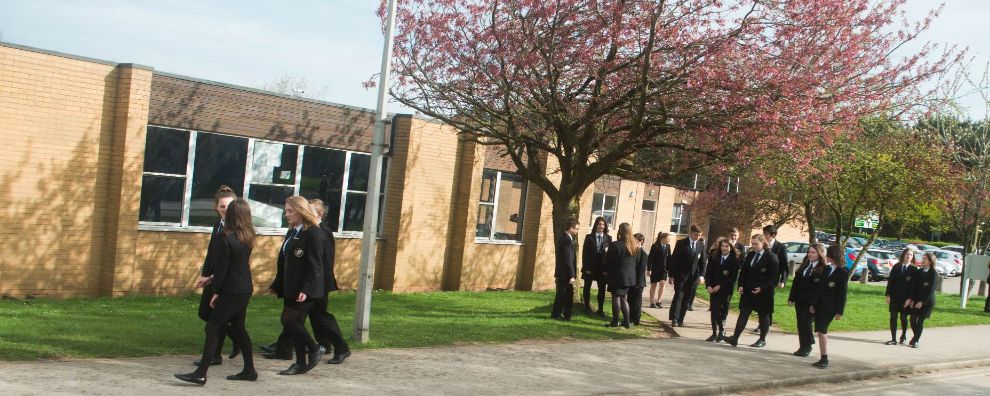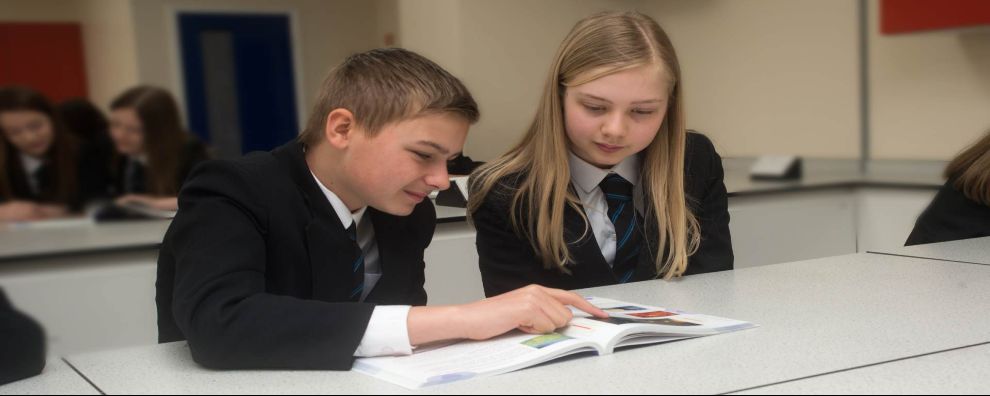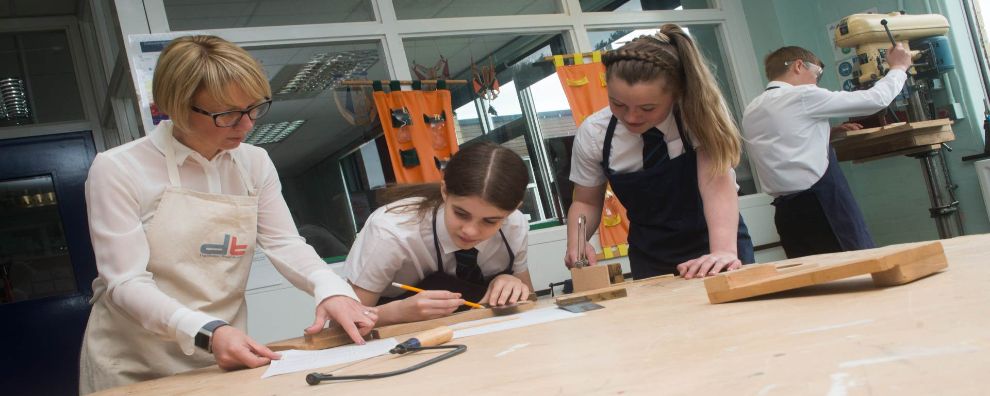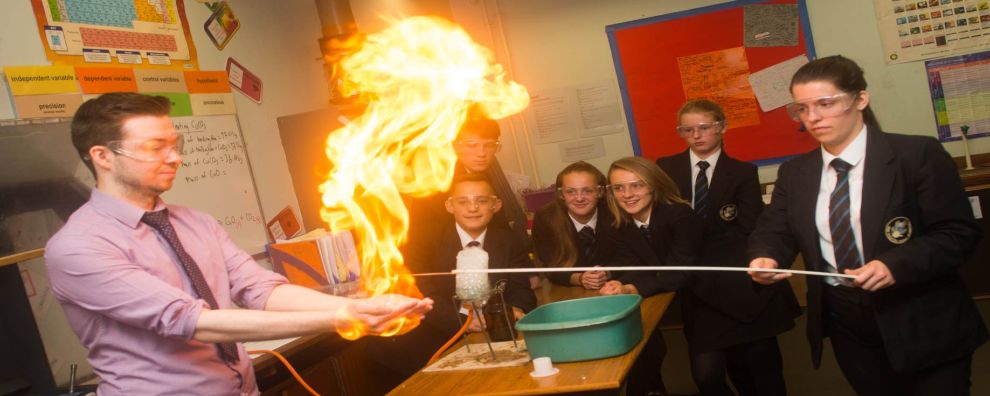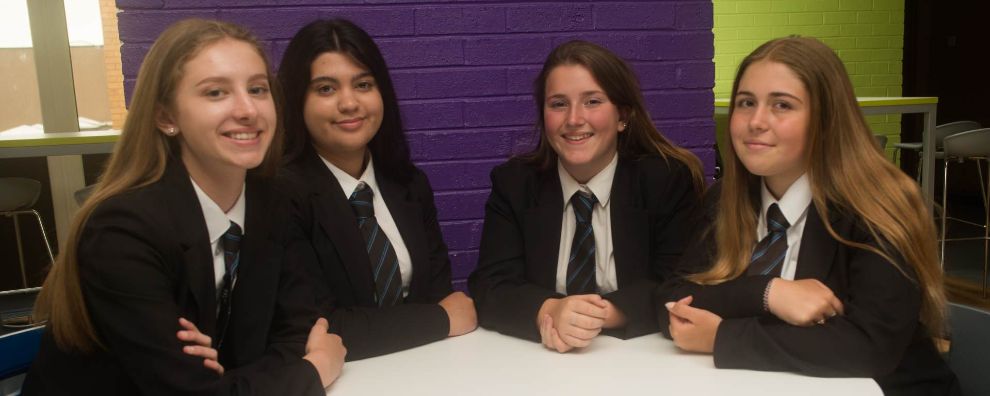Related Pages
- Curriculum Structure & Subjects
- Art
- Computing & Digital Literacy and Business Studies
- English
- SHARE (SOCIAL HEALTH AND RELATIONSHIP EDUCATION)
- Modern Foreign Languages
- Geography
- History
- Mathematics
- Performing Arts
- Physical Education
- Psychology (A level only)
- Science
- Design & Technology
- Learning Support SEN
- Super Curriculum
- Learning Journeys
English
Aim
Through teaching a range of text types and writing styles, and providing opportunities to communicate orally, here in the English Department we aim to develop pupils as critical and insightful readers; imaginative and confident writers and effective and sensitive speakers and listeners.
Taught in a suite of rooms adjacent to a large open area used to facilitate group work, pupils are prepared for the challenges of GCSE examinations from Year 7 and are monitored through a variety of strategies to ensure optimum progress. For all ages and abilities, additional support is accessed through our English Hub – a dedicated room equipped with ICT facilities and staffed by a member of the department to provide independent tuition, opportunities for collaboration and meet pupils’ immediate learning needs.
As all pupils have the opportunity to complete both GCSE English Language and GCSE English Literature, following the specifications set out by Edexcel, the two subjects are studied discretely from Year 7. Assessments are in line with exam requirements and marked to GCSE standards. As well as receiving summative feedback, pupils also gain both written and verbal feedback during lessons and have regular opportunities to reflect on and improve their work.
At Key Stage 5, students can choose to further their studies in English Literature, following an AQA specification. To encourage students to develop their interest in and enjoyment of literature, they read widely and independently, engage creatively with texts and develop and apply their knowledge of literary analysis whilst exploring the writing of some of our most influential writers on the extensive topics of love and war.
Curriculum Overview
Year 7:
- Imaginative Writing
- Transactional Writing (review; speech; letter)
- Analysis of a Gothic text
- Study of a modern play
- Study of two post-1914 novels
- Study of a Shakespeare play
- Poetry
Year 8:
- Reading and comparing non-fiction texts
- Transactional Writing (magazine articles)
- Imaginative Writing
- Reading and responding to 19th century text
- A Shakespeare play
- Study of a modern novel
- GCSE Poetry Anthology – selected poems.
Year 9:
- Reading and responding to fiction texts
- Study of a modern play or novel (GCSE Literature text)
- Imaginative Writing
- Transactional Writing (newspaper articles)
- GCSE Poetry Anthology – selected poems
Year 10:
- Study of a nineteenth century text
- Revision of modern play or novel
- Imaginative Writing
- Transactional Writing
- GCSE Poetry Anthology – selected poems
- Analysis of unseen poetry
- Study of a Shakespeare play
Year 11:
- Enhancing examination skills for English Literature
- Enhancing examination skills for English Language
- Spoken Language Endorsement
Year 12 and 13:
- The study of one prose text which will used to compare with some poems from the AQA Poetry Anthology
- The study of one play by Shakespeare
- Unseen poetry: compulsory essay question on two unseen poems
- The study of the Literature of World War One and its aftermath to the present day
- Response to an unseen extract
- Non-examined assessment: one extended essay of 2,500 words as coursework- students are taught one text then choose their own text to compare
Assessment Frameworks
Year 7-11 GCSE English Language and GCSE English Literature
In addition to the monthly assessments and feedback that each pupil will receive on the quality of work they are producing, every pupil will complete three previously unseen examination style assessments each year. The grade scale ranges from 9-1 with 1 being the lowest grade on the scale and 9 being the highest.
Year 11 English Language and English Literature
|
English Language |
English Literature |
|
Component 1: Fiction and Imaginative Writing Examination 1 hour 45 minutes 40% of the total GCSE
Component 2: Non-Fiction and Transactional Writing Examination 2 hours 60% of the total GCSE
The preparation and assessment of spoken language is compulsory and will be an endorsement for the GCSE. A separate grade will appear on pupils’ certificates alongside the overall grade issued.
|
Component 1: Shakespeare and Post-1914 Literature Examination 1 hour and 45 minutes 50% of the total GCSE
Component 2: 19th- Century Novel and Poetry since 1789 Examination 2 hours and 5 minutes 50% of the total GCSE
A poetry anthology is provided by Edexcel To allow for home study, revision and annotation, it is recommended that all pupils purchase their own copy of their examination texts. |
Year 13 English Literature
Assessment (80 % examination taken at the end of the course; Non-examined assessment (NEA coursework) summited in May of the second year)
Paper 1: Love through the ages
- written exam: 3 hours
- open book in Section C
- 40% of A-level
Section A: Shakespeare: one passage-based essay question (25 marks)
Section B: Unseen poetry: comparison of two unseen poems (25 marks)
Section C: Prose and pre-1900 poetry: one essay question linking the two texts (25 marks)
Paper 2: Texts in a shared context- WWI and its aftermath
Study of three texts
Examination will include an unseen extract
- written exam: 2 hours 30 minutes
- open book
- 40% of A-level
Section A: One essay question on a set text (25 marks)
Section B: One question on an unseen extract (25 marks)
One essay question linking two texts (25 marks)
Non-examined assessment
Comparative study of two texts, at least one must be pre-1900
One extended essay (2500 words) and a bibliography
- coursework
- 20% of A-level
- assessed by teachers and moderated by AQA
Useful Links
BBC Bitesize: http://www.bbc.co.uk/education
Sparknotes – guides to key literature texts: http://www.sparknotes.com
Litcharts – a high level guide to key literature texts: http://www.litcharts.com
Get Revising
Mr Bruff – YouTube clips for GCSE poetry and ‘Macbeth’
Click Revision - online tutorials for ‘An Inspector Calls’
Pearson English Language Revision Guide Edexcel 9-1: ISBN 978-1-4479-8808-3
Pearson English Language Revision Workbook Edexcel 9-1: ISBN 978-1-292-21372-9
Staff List
The teaching and support staff are currently:
Ms A Fowler Subject Leader for English afowler@westonroad.staffs.sch.uk
Mrs L Jones Assistant Subject Leader for English ljones@westonroad.staffs.sch.uk
Mr C Gibbard Teacher of English cgibbard@westonroad.staffs.sch.uk
Miss M Johnson Teacher of English mjohnson@westonroad.staffs.sch.uk
Mrs J Mountford Teacher of English jmountford@westonroad.staffs.sch.uk
Ms G Gatfield Teacher of English ggatfield@westonroad.staffs.sch.uk
Mrs M Chaney Teacher of English mchaney@westonroad.staffs.sch.uk
Mrs N Robinson Teacher of English nrobinson@westonroad.staffs.sch.uk
Mr G Russell Teacher of English grussell@westonroad.staffs.sch.uk

